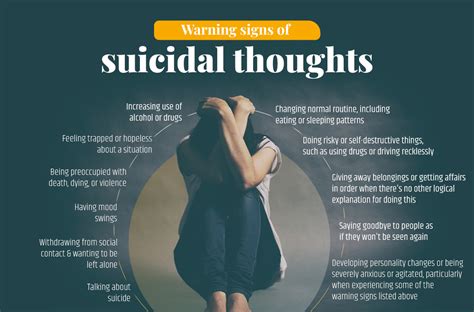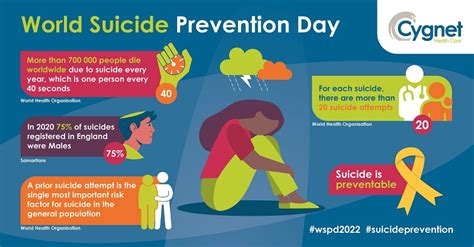Intro
Understanding suicidal thoughts and behaviors, including warning signs, risk factors, and mental health conditions like depression and anxiety, to provide support and resources for prevention and intervention.
Suicidal thoughts are a complex and sensitive topic that affects millions of people worldwide. It's a phenomenon that can be difficult to understand, even for those who have experienced it firsthand. The intricacies of the human mind and the various factors that contribute to suicidal thoughts make it a challenging subject to address. However, it's essential to approach this topic with empathy, compassion, and a willingness to learn. By exploring the underlying causes, warning signs, and available support systems, we can work towards creating a safer and more supportive environment for individuals struggling with suicidal thoughts.
The importance of discussing suicidal thoughts cannot be overstated. It's a topic that has been shrouded in stigma and silence for far too long, leading to a lack of understanding and resources for those who need it most. By breaking down these barriers and encouraging open conversations, we can help individuals feel more comfortable seeking help and support. Moreover, it's crucial to recognize that suicidal thoughts are not a sign of weakness, but rather a symptom of a deeper issue that requires attention and care. By acknowledging this, we can work towards creating a culture that prioritizes mental health and well-being.
The complexities of suicidal thoughts are multifaceted, and it's essential to approach this topic with sensitivity and nuance. It's not just a matter of individual struggles, but also a reflection of the societal and environmental factors that contribute to mental health issues. By examining the interplay between these factors, we can gain a deeper understanding of the root causes of suicidal thoughts and develop more effective strategies for prevention and intervention. Furthermore, it's essential to recognize that suicidal thoughts can affect anyone, regardless of their background, age, or socioeconomic status. By acknowledging this, we can work towards creating a more inclusive and supportive environment that caters to the diverse needs of individuals struggling with mental health issues.
Understanding Suicidal Thoughts

Understanding suicidal thoughts requires a comprehensive approach that takes into account the various factors that contribute to this phenomenon. It's essential to recognize that suicidal thoughts are often a symptom of underlying mental health issues, such as depression, anxiety, or trauma. These conditions can distort an individual's perception of reality, leading to feelings of hopelessness, despair, and suicidal ideation. Moreover, environmental factors, such as social isolation, bullying, or financial struggles, can exacerbate these feelings and increase the risk of suicidal thoughts.
Causes of Suicidal Thoughts
The causes of suicidal thoughts are complex and multifaceted. Some of the most common factors that contribute to suicidal thoughts include: * Mental health conditions, such as depression, anxiety, or bipolar disorder * Trauma, abuse, or neglect * Social isolation or loneliness * Financial struggles or poverty * Bullying or harassment * Substance abuse or addiction * Chronic illness or pain * Loss of a loved one or significant life changeWarning Signs of Suicidal Thoughts

Recognizing the warning signs of suicidal thoughts is crucial for early intervention and prevention. Some common signs include:
- Talking about suicidal thoughts or feelings
- Expressing feelings of hopelessness or despair
- Withdrawing from social activities or relationships
- Engaging in reckless or self-destructive behavior
- Giving away possessions or making arrangements for dependents
- Saying goodbye to loved ones or making amends
- Exhibiting sudden changes in mood or behavior
Identifying High-Risk Individuals
Identifying high-risk individuals is essential for providing targeted support and intervention. Some groups that are at a higher risk of suicidal thoughts include: * Adolescents and young adults * Individuals with a history of mental health conditions or trauma * Those who have experienced a recent loss or significant life change * Individuals who have been bullied or harassed * Those who have a family history of mental health conditions or suicidal behaviorSupport Systems for Suicidal Thoughts

Having a strong support system is essential for individuals struggling with suicidal thoughts. Some available support systems include:
- Mental health professionals, such as therapists or counselors
- Support groups, either online or in-person
- Hotlines or crisis centers, such as the National Suicide Prevention Lifeline
- Trusted friends or family members
- Online resources and forums
Therapy and Treatment Options
Therapy and treatment options are available for individuals struggling with suicidal thoughts. Some common approaches include: * Cognitive-behavioral therapy (CBT) * Dialectical behavior therapy (DBT) * Psychodynamic therapy * Medication, such as antidepressants or mood stabilizers * Alternative therapies, such as art or music therapyPrevention and Intervention Strategies

Prevention and intervention strategies are crucial for reducing the risk of suicidal thoughts and behaviors. Some effective strategies include:
- Early intervention and treatment for mental health conditions
- Social support and connection
- Education and awareness about mental health and suicidal thoughts
- Reducing access to means of suicide, such as firearms or medications
- Encouraging healthy coping mechanisms and stress management techniques
Creating a Supportive Environment
Creating a supportive environment is essential for individuals struggling with suicidal thoughts. Some ways to create a supportive environment include: * Encouraging open conversations about mental health and suicidal thoughts * Reducing stigma and promoting understanding * Providing access to resources and support systems * Fostering a sense of community and connection * Promoting healthy habits and self-care practicesConclusion and Next Steps

In conclusion, suicidal thoughts are a complex and sensitive topic that requires a comprehensive approach. By understanding the causes, warning signs, and available support systems, we can work towards creating a safer and more supportive environment for individuals struggling with suicidal thoughts. It's essential to prioritize mental health and well-being, reduce stigma and promote understanding, and provide access to resources and support systems.
If you or someone you know is struggling with suicidal thoughts, it's essential to seek help immediately. You can call the National Suicide Prevention Lifeline at 1-800-273-TALK (8255) or text the Crisis Text Line at 741741. Remember, suicidal thoughts are not a sign of weakness, and seeking help is a sign of strength.
We invite you to share your thoughts and experiences with us. Have you or someone you know struggled with suicidal thoughts? What support systems have you found most helpful? Share your story with us, and let's work together to create a more supportive and inclusive environment for individuals struggling with mental health issues.
What are the most common causes of suicidal thoughts?
+The most common causes of suicidal thoughts include mental health conditions, such as depression, anxiety, or bipolar disorder, trauma, abuse, or neglect, social isolation or loneliness, financial struggles or poverty, bullying or harassment, substance abuse or addiction, chronic illness or pain, and loss of a loved one or significant life change.
How can I identify someone who is struggling with suicidal thoughts?
+Some common warning signs of suicidal thoughts include talking about suicidal thoughts or feelings, expressing feelings of hopelessness or despair, withdrawing from social activities or relationships, engaging in reckless or self-destructive behavior, giving away possessions or making arrangements for dependents, saying goodbye to loved ones or making amends, and exhibiting sudden changes in mood or behavior.
What support systems are available for individuals struggling with suicidal thoughts?
+Some available support systems include mental health professionals, such as therapists or counselors, support groups, either online or in-person, hotlines or crisis centers, such as the National Suicide Prevention Lifeline, trusted friends or family members, and online resources and forums.
